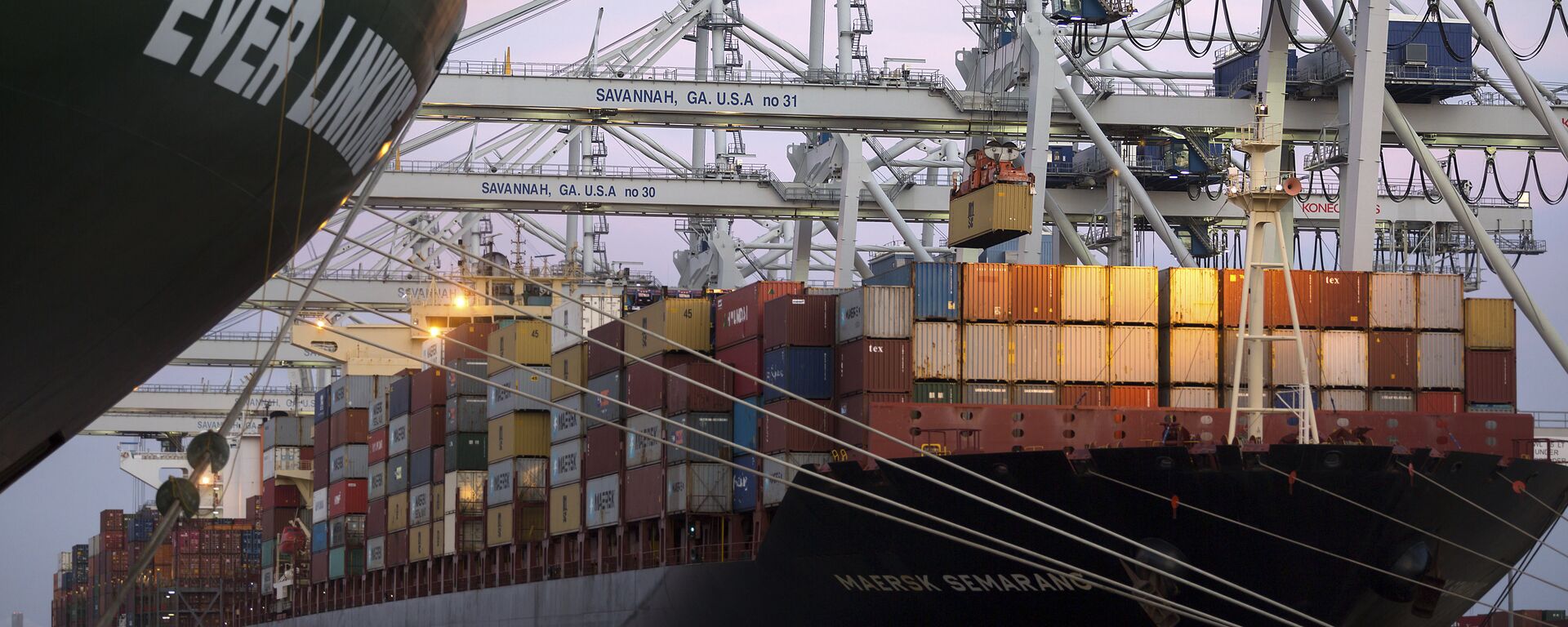https://sputnikglobe.com/20221003/probably-uncomfortable-for-most-people-denmark-lowers-down-inside-temperature-to-save-energy-1101450132.html
'Probably Uncomfortable for Most People': Denmark Lowers Down Inside Temperature to Save Energy
'Probably Uncomfortable for Most People': Denmark Lowers Down Inside Temperature to Save Energy
Sputnik International
According to scientists, Denmark's recent move to lower inside temperatures in a bid to tackle the growing energy crunch will be unpleasant for most Danes... 03.10.2022, Sputnik International
2022-10-03T07:27+0000
2022-10-03T07:27+0000
2022-10-03T07:27+0000
energy crisis in europe
denmark
scandinavia
energy crisis
heating
nord stream
newsfeed
https://cdn1.img.sputnikglobe.com/img/105224/42/1052244208_0:87:1921:1167_1920x0_80_0_0_38ae3ee12a5a0167dbce8828411dce97.jpg
As part of measures to tackle the growing energy crisis, the Danish government has lowered the temperature in public buildings across the country.Throughout the winter, the temperature at Danish town halls, schools and other public buildings will not exceed 19 degrees. Private companies were also advised to follow suit.According to Jørn Toftum, a professor at the Technical University of Denmark (DTU) and a researcher in indoor climates, this will make a noticeable difference for Danes with a sedentary office job.The decision to lower the heating temperature will thus be felt in hands, feet and noses becoming cold, as the blood will concentrate around vital organs. This can affect the flexibility of the fingers for those who have to type a lot. According to Toftrum, this may affect the productivity of Danes.According to DTU professor of construction physics Carsten Rode, a lower indoor temperature provides a more humid environment, and moisture, in turn, can deteriorate the indoor climate and buildings, allowing better conditions for mold to grow.“Many people cannot tolerate mold, so we get sick to varying degrees from it, and that is unfortunate”, Rode said.Around the country, school teachers have been asked to alternate between physical activities and sedentary school work and advise the children to put on an extra shirt.“It may well be a bit uncomfortable for the students,” acting headteacher at Peder Lykke School Jasminka Ibrisimovic told TV2.Earlier, Danish authorities have warned citizens of looming outages during the coming winter, as Europe's unprecedented power crisis following Brussels' sanctions against Russian energy gets worse. The spike in energy prices is, in turn, ramping up household costs and general inflation across Europe. The crisis was exacerbated by the EU's massive sanctions against Russian energy intended as “punishment” for Moscow's special operation in Ukraine. However, the sanctions backfired, piling on Europe's ballooning cost-of-living crisis, as governments are spending hundreds of billions of euros to ease the economic pain.At the same time, gas deliveries from Russia are bound to remain limited, given that the Nord Stream 1 and Nord Stream 2 offshore pipelines in the Baltic Sea were badly damaged by explosions and rendered inoperative last week in what Moscow called “act of international terrorism.”To offset the aftershocks of the energy crisis, rigid savings measures have been taken across Europe, as countries are scrambling to replace Russian energy. Among others, German regions banned the illumination of landmarks and switched to cold showers in public buildings, whereas France dimmed street lighting.Danes were already asked by the authorities to limit the use of hot water, save electricity by switching off unnecessary lighting and appliances and use electricity when it is cheapest. They were also asked to change their driving habits (slow down and refrain from air conditioning) to save petrol and diesel.Earlier in September, it was even proposed to allow Danish consumers to postpone paying part of their energy and heating costs as the energy crisis makes a serious dent in household budgets. The measure is designed to relieve the pressure and is expected to cost DKK 45 billion ($6.1 billion).
https://sputnikglobe.com/20220913/danish-inflation-hits-four-decade-high-as-food-energy-prices-go-through-the-roof-1100703529.html
denmark
scandinavia
Sputnik International
feedback@sputniknews.com
+74956456601
MIA „Rosiya Segodnya“
2022
News
en_EN
Sputnik International
feedback@sputniknews.com
+74956456601
MIA „Rosiya Segodnya“
Sputnik International
feedback@sputniknews.com
+74956456601
MIA „Rosiya Segodnya“
denmark, scandinavia, energy crisis, heating, nord stream, newsfeed
denmark, scandinavia, energy crisis, heating, nord stream, newsfeed
'Probably Uncomfortable for Most People': Denmark Lowers Down Inside Temperature to Save Energy
According to scientists, Denmark's recent move to lower inside temperatures in a bid to tackle the growing energy crunch will be unpleasant for most Danes, result in a drop in concentration and efficiency and allow better conditions for mold to grow.
As part of measures to tackle the growing energy crisis, the Danish government has lowered the temperature in public buildings across the country.
Throughout the winter, the temperature at Danish town halls, schools and other public buildings will not exceed 19 degrees. Private companies were also advised to follow suit.
According to Jørn Toftum, a professor at the Technical University of Denmark (DTU) and a researcher in indoor climates, this will make a noticeable difference for Danes with a sedentary office job.
“It will probably be uncomfortable for most people”, he
told TV2, adding that most people's comfort temperature is a tad higher — at around 20-22 degrees.
The decision to lower the heating temperature will thus be felt in hands, feet and noses becoming cold, as the blood will concentrate around vital organs. This can affect the flexibility of the fingers for those who have to type a lot. According to Toftrum, this may affect the productivity of Danes.
“One you start to freeze, you cannot concentrate as well”, he said, stressing that the best temperature to be able to concentrate optimally is 21 degrees. At the same time, individual perception varies, though women appear to generally prefer a higher temperature.
According to DTU professor of construction physics Carsten Rode, a lower indoor temperature provides a more humid environment, and moisture, in turn, can deteriorate the indoor climate and buildings, allowing better conditions for mold to grow.
“Many people cannot tolerate mold, so we get sick to varying degrees from it, and that is unfortunate”, Rode said.
Around the country, school teachers have been asked to alternate between physical activities and sedentary school work and advise the children to put on an extra shirt.
“It may well be a bit uncomfortable for the students,” acting headteacher at Peder Lykke School Jasminka Ibrisimovic told TV2.

13 September 2022, 05:33 GMT
Earlier, Danish authorities have warned citizens of looming outages during the coming winter, as Europe's unprecedented power crisis following Brussels' sanctions against Russian energy gets worse. The spike in energy prices is, in turn, ramping up household costs and general inflation across Europe. The crisis was exacerbated by the EU's massive sanctions against Russian energy intended as “punishment” for Moscow's special operation in Ukraine. However, the sanctions backfired, piling on Europe's ballooning cost-of-living crisis, as governments are spending hundreds of billions of euros to ease the economic pain.
At the same time, gas deliveries from Russia are bound to remain limited, given that the Nord Stream 1 and Nord Stream 2 offshore pipelines in the Baltic Sea were badly damaged by explosions and rendered inoperative last week in what Moscow called “act of international terrorism.”
To offset the aftershocks of the energy crisis, rigid savings measures have been taken across Europe, as countries are scrambling to replace Russian energy. Among others, German regions banned the illumination of landmarks and switched to cold showers in public buildings, whereas France dimmed street lighting.
Danes were already asked by the authorities to limit the use of hot water, save electricity by switching off unnecessary lighting and appliances and use electricity when it is cheapest. They were also asked to change their driving habits (slow down and refrain from air conditioning) to save petrol and diesel.
Earlier in September, it was even proposed to allow Danish consumers to postpone paying part of their energy and heating costs as the energy crisis makes a serious dent in household budgets. The measure is designed to relieve the pressure and is expected to cost DKK 45 billion ($6.1 billion).





